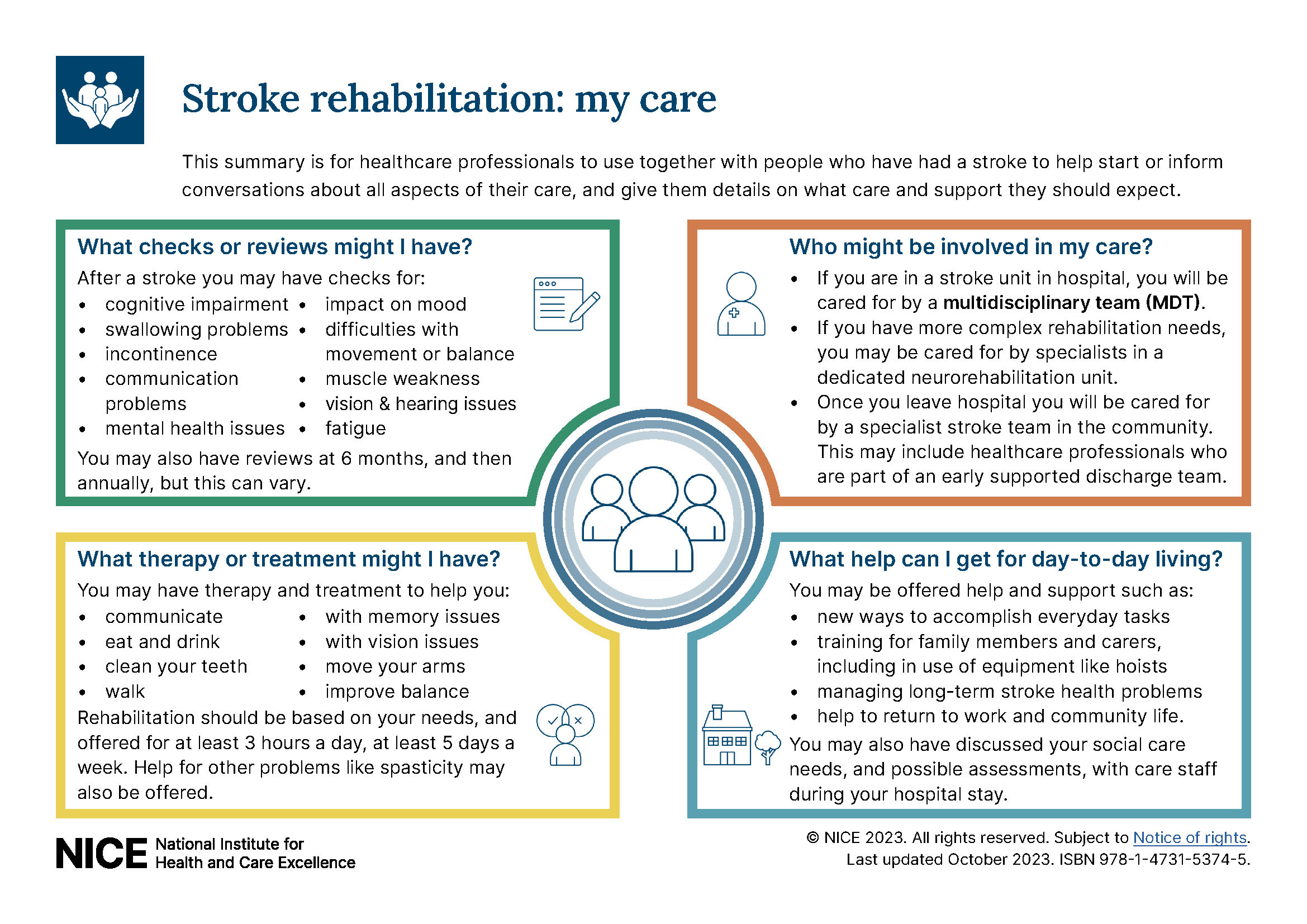Overview
This guideline covers rehabilitation after stroke for over 16s. It aims to ensure people are assessed for common problems and conditions linked to stroke, and get the care and therapy they need. It includes recommendations on the organisation and delivery of rehabilitation in hospital and the community.
NICE has also produced a guideline on the diagnosis and initial management of stroke transient ischaemic attack in over 16s.
Last reviewed: 18 October 2023
This guideline updates and replaces NICE guideline CG162 (2013).
Next review: This guideline will be reviewed if there is new evidence that is likely to change the recommendations
How we prioritise updating our guidance
Decisions about updating our guidance are made by NICE’s prioritisation board. For more information on the principles and process, see NICE-wide topic prioritisation: the manual.
For information about individual topics, including any decisions affecting this guideline, see the summary table of prioritisation board decisions.
Recommendations
This guideline includes new and updated recommendations on:
- intensity of stroke rehabilitation
- assessment for fatigue and for vision problems
- screening for hearing problems
- assessments and interventions to support mouth care, swallowing and walking
- managing shoulder pain and spasticity
- transfer of care from hospital to a community setting, including early supported discharge
- telerehabilitation
- community participation and return-to-work programmes
It also includes recommendations on:
- organising rehabilitation services
- planning rehabilitation, including goal setting
- screening, assessment and interventions for cognitive impairment and psychological changes, and difficulties with communication and movement
- providing information and support
- self-care and long-term health and social support
See the 2-page visual summary to aid discussions between healthcare professionals and people who have had a stroke about care and support.
Who is it for?
- Healthcare professionals
- Social care practitioners
- Commissioners and providers
- Voluntary organisations
- All adults and young people aged 16 and over who have had a stroke and their families and carers
Guideline development process
How we develop NICE guidelines
Your responsibility
The recommendations in this guideline represent the view of NICE, arrived at after careful consideration of the evidence available. When exercising their judgement, professionals and practitioners are expected to take this guideline fully into account, alongside the individual needs, preferences and values of their patients or the people using their service. It is not mandatory to apply the recommendations, and the guideline does not override the responsibility to make decisions appropriate to the circumstances of the individual, in consultation with them and their families and carers or guardian.
All problems (adverse events) related to a medicine or medical device used for treatment or in a procedure should be reported to the Medicines and Healthcare products Regulatory Agency using the Yellow Card Scheme.
Local commissioners and providers of healthcare have a responsibility to enable the guideline to be applied when individual professionals and people using services wish to use it. They should do so in the context of local and national priorities for funding and developing services, and in light of their duties to have due regard to the need to eliminate unlawful discrimination, to advance equality of opportunity and to reduce health inequalities. Nothing in this guideline should be interpreted in a way that would be inconsistent with complying with those duties.
Commissioners and providers have a responsibility to promote an environmentally sustainable health and care system and should assess and reduce the environmental impact of implementing NICE recommendations wherever possible.
